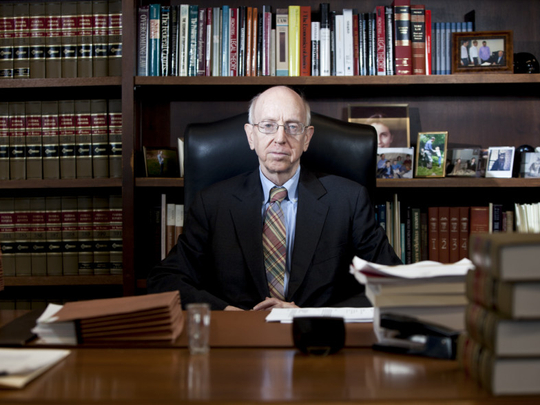
Richard Posner
By William Domnarski, Oxford University Press, 304 pages, $30
Once in every great while, nature and nurture combine in a single person the qualities of erratic genius, herculean work ethic and irrepressible ambition. Think of Picasso in art, Ali in boxing or Roth in literature. Add a penchant for provocation untethered to the constraints of conventional human interaction and you get, in the law, Judge Richard Posner of the United States Court of Appeals for the Seventh Circuit in Chicago.
In the past half-century there has been no figure more dominant or more controversial in American law than Posner. He has written more than 50 books, over 500 articles and nearly 3,000 majority opinions for his court. Not even Supreme Court Justice Oliver Wendell Holmes Jr — to whom he is often compared — matches his productivity and range.
William Domnarski’s biography, the first such book on Posner, draws on extensive interviews and on access to Posner’s correspondence at the University of Chicago. “Richard Posner” portrays a man who aims self-consciously to be (in his words) a “Promethean intellectual hero”, remaking the world of the law by sheer will. The questions Domnarski asks are: what makes this extraordinary character tick — and to what end?
Posner was born in New York City in 1939 to parents who were Communists, or at least fellow travellers. He held traditionally left-liberal views into adulthood, including the time of his clerkship on the Supreme Court with a liberal lion, Justice William Brennan. But he was restless and sometimes even bored. He considered leaving the law for graduate training in literature. In the late 1960s, however, he discovered economics. Legal thought has never been the same.
As a young law professor in the late 1960s and 1970s, Posner became the country’s most aggressive proselytiser for bringing modern economics into law. After Ronald Reagan appointed him to the bench in 1981, Posner introduced many of the same ideas to the practice of judging. In both roles, Posner has gone further than anyone else in making economic ideas a lingua franca of intellectual life in the law.
Yet if Posner’s connection to economics has been his principal claim to fame, his most distinctive approach to economic thinking in the law captures the conundrum at the heart of his career. In the late 1970s Posner began to argue that the law ought not to protect rights (as traditional liberals would say) or promote happiness (as utilitarians would propose). Instead, law ought to maximise the wealth of the society.
The idea of wealth maximisation, however, is famously obtuse. Posner observed that his theory treated unproductive people as morally irrelevant (or worse) and viewed social resources expended on the poor as wasted. Questions about the distribution of a society’s wealth, he argued, were properly excluded from legal analysis altogether. Posner adopted his wealth-maximisation theory at the same moment in which, as we now know, market-oriented public policies began to exacerbate socioeconomic inequality. Notoriously, Posner entertained the idea (though he thought it implausible) that it might be best not to punish the crime of rape if the rapist enjoys the act enough to outweigh the harm to the victim; the reason to criminalise rape, he argued, was to channel sex into forms such as marriage, in which women are compensated like other sex workers. He suggested openness to the notion of selling babies.
Such ideas may have deprived Posner of a chance at the Supreme Court. But his mistake was conceptual as well as political. The core problem was that he substituted a way of achieving value (dollars) for value itself. He treated wealth as an end instead of as a means.
In more recent years, Posner has largely disowned the most extreme versions of his economic theorising. In an astounding number of books he has championed a more eclectic approach to law and public policy. He approved the impeachment of President Bill Clinton but thought the Senate was right not to convict. He dismissed the Supreme Court’s legal arguments in the election of 2000 but applauded the court for ending a destabilising election crisis. After 9/11 he exhorted decision makers to take seriously the grave risks of national security crises while criticising the Bush administration for foolish overreactions. In recent years he has even tacked left on issues such as voter ID laws, gun rights, abortion rights and Keynesian economics.
Posner’s fierce mind is still on vivid display. He insists, for example, that judges have no moral or political obligation to adhere to the text of the Constitution, or to follow precedents set by prior cases. The Posnerian judge looks only to social consequences. The difficulty is that law itself (as Posner well knows) is precisely an attempt to resolve disagreement over the meaning and significance of those consequences. His recent books and even his judicial opinions sometimes devolve into ad hoc tabulations of one man’s fascinating but idiosyncratic social accounting.
Domnarski’s biography reveals interesting details about the man. We see Posner privately skewering colleagues. We see him calling himself “a monster” and disdaining conventional morality. He writes of “dumb right-wingers”, while expressing equal contempt for the left.
Ultimately, the difference between Posner and a Picasso, Ali or Roth is that Posner’s chosen method is imperfectly suited to his métier. As Domnarski observes, few judges have been willing to adopt the economic theories for which Posner is best known. Compiling costs and benefits, it turns out, is not a path to influence for a judge. Posner himself is painfully aware of this. It is a deep flaw in his thinking, though it is a great credit to his life, that he has run the cost-benefit calculation, found it wanting, and persisted nonetheless.
–New York Times News Service
John Fabian Witt, the Allen H. Duffy class of 1960 professor of law at Yale Law School, is the author, most recently, of “Lincoln’s Code: The Laws of War in American History”.









